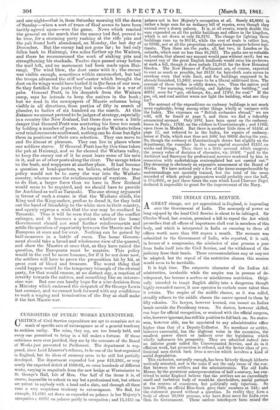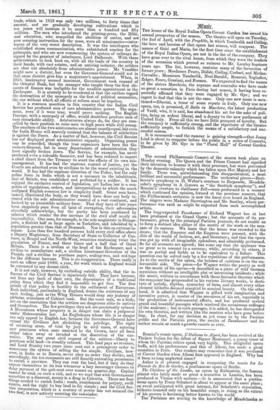THE INDIAN CIVIL SERVICE.
AGREAT change, not yet appreciated in England, is impending over the Government of India. The monopoly of power so long enjoyed by the local Civil Service is about to be infringed. Sir Charles Wood, last session, promised a bill to repeal the Act which prescribes that all offices of importance shall vest in members of this body, and which is interpreted in India as ensuring to them all offices worth more than 800 rupees a month. The measure was submitted to the Government of India, who reported, it is said, in favour of a compromise, the admission of nine persons a year from India itself into the Civil Service, and the withdrawal of the judiciary from their hands. These recommendations may or may not
be adopted, but the repeal of the restrictive clauses this session would seem to be inevitable.
It is high time. The corporate "character of the Indian Ad- ministration, invaluable while the empire was in process of de- velopment, has become a useless or mischievous restriction. Origi- nally intended to tempt English ability into a dangerous though highly.rewarded career, it now operates to exclude more talent than
it retains. The empire of the middle classes, as it was called, steadily refuses to the middle classes the career opened to them by fifty colonies. No lawyer, however learned, can mount an Indian bench outside the Presidency towns. No doctor, however skilled, can hope for official recognition, or contend with the official surgeon, who, however ignorant, has still his position to fall back on. No states- man, however able, can be appointed to any administrative office higher than that of a Deputy-Collector. No merchant or settler, however successful, has the slightest voice in the executive, the smallest power direct or indirect over the legislation which vitally influences his prosperity. They are admitted indeed into an inferior grade called the Uncovenanted Service, and do in it efficient work, but promotion is refused, and the better class of pro- fessional men shrink back from a service which involves a kind of social degradation. This exclusion, naturally enough, has been bitterly though hitherto uselessly resented, and is the main if not the only cause of the con- flict between the settlers and the administration. The old India House, by the persistent misrepresentation of half a century, has con- trived to make England believe that the settlers are an exceedingly small and turbulent body of would-be slaveholders, useful perhaps at the centres of commerce, but politically only injurious. So late as 1860, an official Blue-book gave their numbers at 343; and the statement passed without a question. In reality they form a body of about 30,000 persons, who have done more for India even than its Government. These useless interlopers have raised the trade, which in 1813 was only two millions, to forty times that amount, and are gradually developing cultivations which in ten years will increase it to more than a hundred and fifty millions. The men who introduced the printing-press, the Bible, and education, who compelled the abolition of suttee, and are now securing instruction for the mass, were all missionaries—inter- lopers of the very worst description. It was the interlopers who established steam communication, who substituted coaches for the palanquin, and who are now commencing the system of railways de- signed by the greatest of interlopers, Lord Dalhousie. With these achievements to look back on, with all the trade of the country in their hands, with vast estates, and an untiring industry, the settlers are shut out absolutely from administrative power. -Mr. Venables might save a district, but even the Governor-General .could not in that same district give him a magistrate's appointment. When, in 1858, bankruptcy seemed imminent, Government took counsel of the Oriental Bank, but the manager who taught them the first ele- ments of finance was ineligible for the smallest appointment in the Exchequer. It is scarcely to be wondered at that the settlers regard the destruction of the monopoly as the first of political necessities, the one without which all efforts at reform must be hopeless. It is a common assertion in this country that the Indian Civil Service has produced men of rare administrative power. The argu- ment, even if it were true, would prove nothing. The English Peerage, with a monopoly of office, would doubtless produce men of very remarkable ability. Aristocracies always do, for they are com- pelled by their position to raise men to high posts while still young. The numbers of the two aristocracies are almost exactlyequal, but even the India House will scarcely contend that the balance of celebrities is against the Peers. As a matter of fact, however, the Civil Service has not displayed great administrative capacity. Organizing power may be conceded, though the true organizers have been the Go- vernors-General, but in many departments of administration they have signally broken down. The Service, for example, has never produced even a tolerable financier, and has been reduced to import a chief direct from the Treasury to avert the effects of its own mis- management. It has had the supreme control of justice, yet the Courts are admitted even by civilians to be the worst existing in the world. It has had the supreme direction of the Police, but the only police force in India which is not a nuisance to the inhabitants, that of Scinde, was established and perfected by a soldier. It has enjoyed the exclusive control of legislation, yet Indian law is a con- geries of regulations, orders, and interpretations to which the much maligned English common law is simplicity itself. Great men have, indeed, illustrated the body, as they would have done any body in- vested with the sole administrative control of a vast continent, and backed by an irresistible military force. That they have of late years been singularly pure from all taint of corruption, their adversaries cheerfully acknowledge, but the purity has been purchased by salaries which render the due increase of the civil staff nearly an impossibility: One man, for example, is the sole magistrate in Dinage- pore, a district half as large again as Yorkshire, and inhabited by a population greater than that of -Denmark. Nor is this an extreme in- stance. Less than five hundred persons hold every civil office above a Deputy Magistracy, from Secretary of State to Collector of Cus- toms, in Bengal and the North-West, countries containing twice the population of France, and three times and a half that of Great Britain. There is a civilian at the head of the Exchequer, and a civilian to manufacture salt, a civilian Lieutenant-Governor of the Punjab, and a civilian to purchase paper, sealing-wax, and red-tape i for the different bureaus. This is no exaggeration. There really s such an officer paid 1800/. a year, for work which in E gland would be entrusted to any decent clerk. It is not only, however, by excluding outside ability, that the in- fluence of the Civil Service is injuriously felt. They have become, not from any fault of their own, the depositaries of a traditional policy from which they find it impossible to get free. The first article of that policy is hostility to the settlement of Europeans. Each individual, particularly in England, denies the existence of any such feeling, just as the Whig Houses would deny any jealousy of plebeian statesmen of Cabinet rank. But the same men, as a body, act on the conviction that the settlers are dangerous alike to natives and themselves. The few privileges they ask are persistently refused. A Mussulman whose property is in danger can claim a judgment under Malommedan law. An E glishman whose life is in danger can only appeal to English law, because the Governors-General aye vetoed the Civilians Act abolishing the privilege. The right of retaining arms, of trial by jury in civil- cases, of entering new provinces when once annexed to the Crown, have all been either taken away or invaded at the discretion of the exe- cutive. The one great civil request of the settlers—liberty to purchase wild land—is steadily refused. This land pays no revenue, and Lord Stanley two years since sent out a peremptory order to commence the system of selling the fee simple. Civilians, how- ever, in India as in Russia, never obey an order they dislike, and, accordingly, the tea companies are still humbly entreating permission to enrich a province.They can rent the land, but if they do they expose themselves to its loss whenever a lazy messenger chooses to delay payment of the quit-rent over sunset on quarter.clay. Capital cannot be sunk on such a risk, and so we read that with Government securities at a discount, money is a drug in Calcutta. There are four things needed to enrich India : roads, punishment for perjury, swift courts, and the right to buy land in fee simple ; and the Civil Ser- vice corporation, which in a century of power has not secured the two first, is now actively resisting the remainder.































 Previous page
Previous page